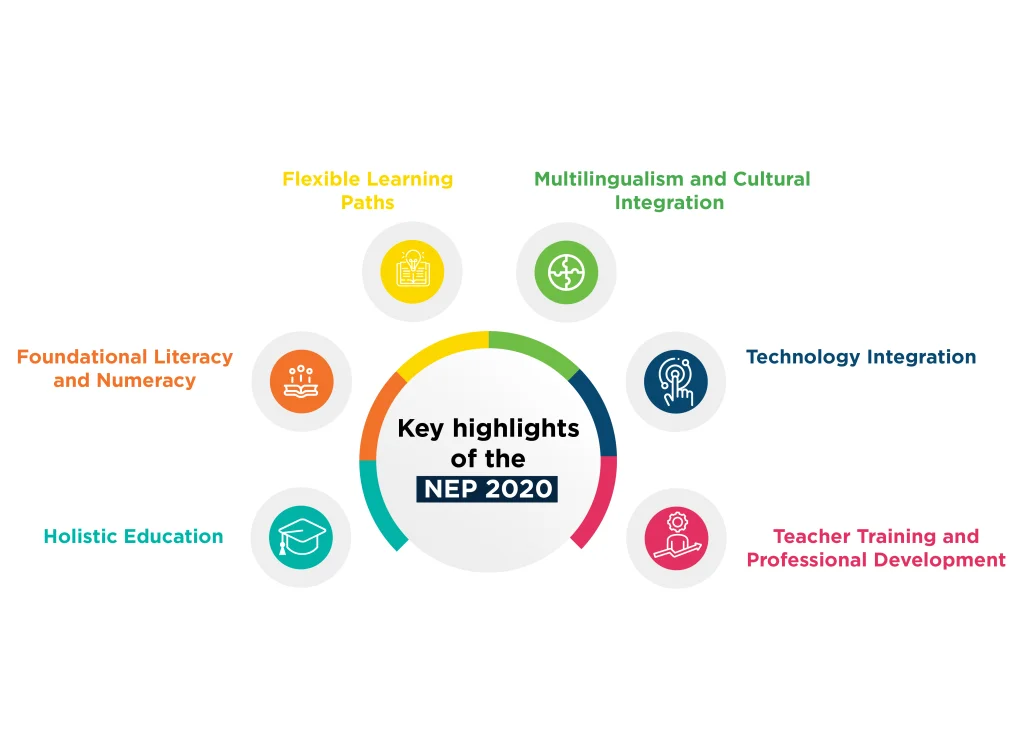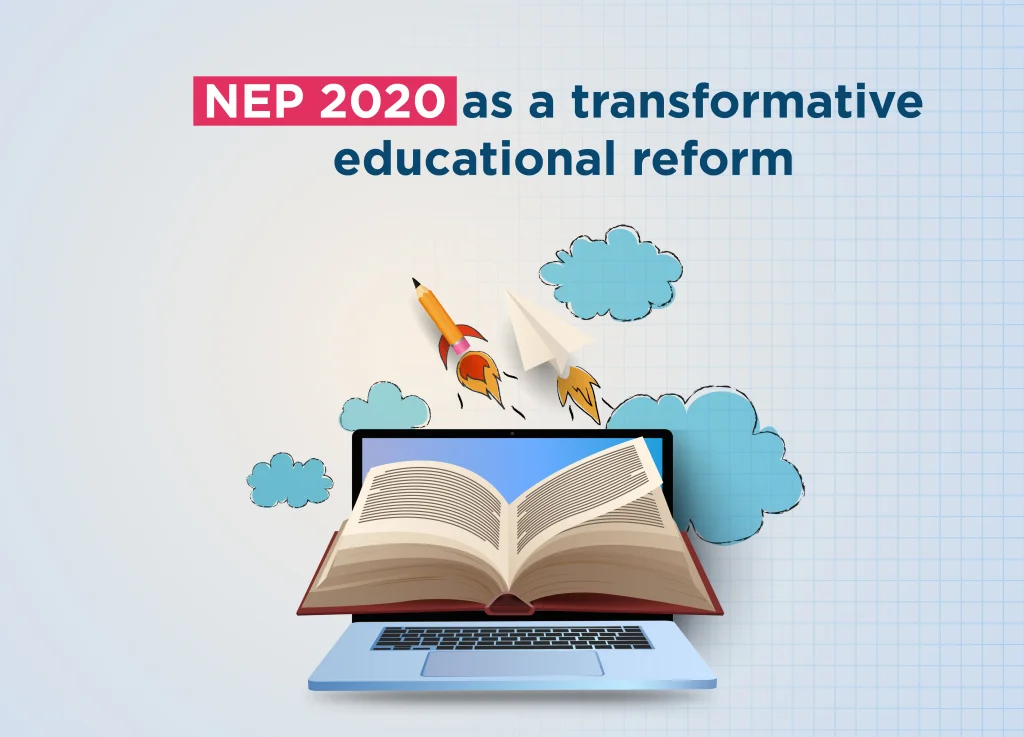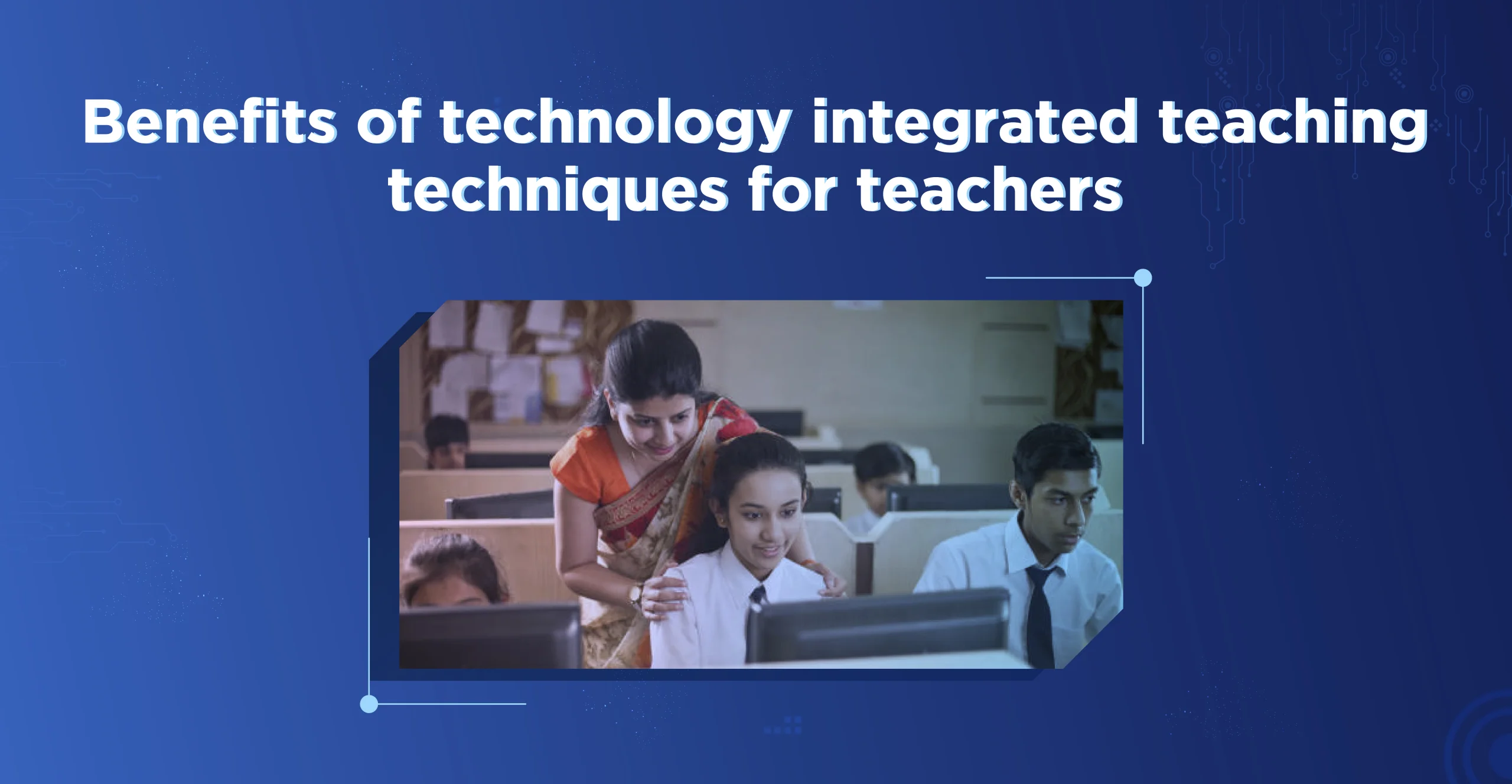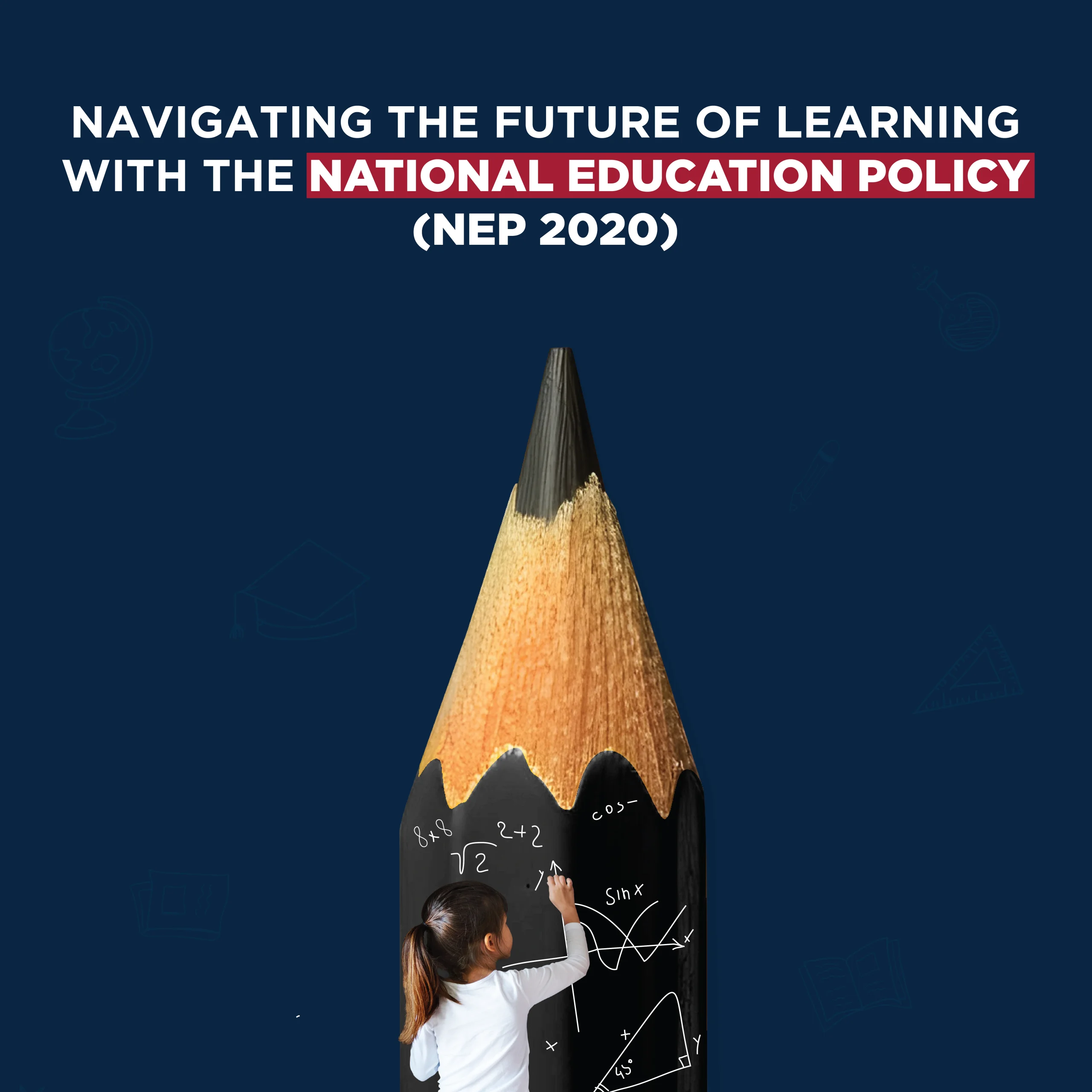No products in the cart.

The National Education Policy (NEP) 2020 is a path-breaking educational policy that aims to transform the education system through schools in India. Under the NEP guidelines, it is essential for schools to adopt and implement quality and technology-integrated teaching methods, helping facilitate the academic growth of students.
About the NEP 2020:
India's National Education Policy 2020 marks a significant milestone in the country’s education system, aiming to transform it into a dynamic, inclusive, and holistic learning environment. This policy, formulated after three decades, seeks to address the evolving needs of learners, promote skill development, and foster innovation in education. In this blog, we will delve into the key highlights of India's National Education Policy 2020 and explore the potential impact it holds for students, educators, and the nation as a whole.
The National Education Policy 2020 also emphasises the integration of technology in education. The policy promotes a holistic teaching approach with technology-integrated video lessons in alignment with the NEP 2020. This helps schools implement blended teaching-learning methods in their classrooms. The holistic and multidisciplinary learning methods promoted by the NEP aim to upgrade education in schools through the latest trends and learning technologies, equipping students with 21st-century skills needed to succeed in today's digital world.
Key highlights of the NEP 2020:

The NEP 2020 sets forth a vision for transforming the Indian education system, focusing on quality, accessibility, equity, and lifelong learning. Its implementation helps bring about comprehensive reforms in education across the country.
1. Holistic Education:
The National Education Policy 2020 emphasises a shift from traditional rote learning to a holistic learning approach. It encourages teachers to develop critical thinking, problem-solving, creativity, and communication skills in students. The policy promotes a multidisciplinary approach, allowing teachers to explore diverse teaching methods encouraging the integration of arts, sports, and vocational education.
2. Foundational Literacy and Numeracy:
Recognising the importance of strong foundational skills, the policy places emphasis on early childhood care and education. It aims to ensure that schools provide every child necessary basic literacy and numeracy skills by the third grade. This focus on foundational learning forms the bedrock for subsequent educational achievements.
3. Flexible Learning Paths:
The policy acknowledges the unique abilities and interests of students and emphasises the need for flexible learning paths. It introduces a 5+3+3+4 academic structure, replacing the traditional 10+2 educational system, with the aim of providing a more holistic and flexible education structure. This structure adds pre-primary education under the umbrella of formal education. The policy also encourages vocational education from an early age to help teachers equip students with practical skills.
4. Multilingualism and Cultural Integration:
Recognising the linguistic and cultural diversity of India, the policy emphasises multilingualism during students’ foundational years. It encourages the teaching and learning of multiple languages, including regional languages, to preserve and promote cultural diversity. This helps students learn in their regional language, helping them understand concepts more effectively.
5. Technology Integration:
The National Education Policy 2020 recognises the importance of technology in education and encourages its integration into the classroom learning process. The policy aims to enhance teaching and learning experiences by leveraging digital tools, online resources, and e-learning platforms. The integration of technology is expected to facilitate personalised learning, provide access to quality education in remote areas, and improve the overall efficiency of the education system.
6. Teacher Training and Professional Development:
The policy recognises the crucial role of teachers in shaping the future of education. It emphasises the need for continuous professional development, fostering a supportive and conducive environment for teachers. The policy also encourages the use of technology for teacher training and provides opportunities for career advancement.
NEP 2020 as a transformative educational reform:

India's National Education Policy 2020 sets forth a visionary roadmap for transforming the country's education system. With its emphasis on holistic learning, flexible pathways, technology integration, and teacher development, the policy seeks to equip learners with the skills and knowledge necessary to excel in the 21st century. Emphasis is also laid on the integration of technology in education, along with reforms in professional development for teachers.
The NEP 2020 aims to bring about the following changes in education:
- Multidisciplinary and holistic education
- Good school education structure
- Promote digital literacy
- Implement blended teaching-learning practices
- Provide equal learning opportunities
- Lay emphasis on professional development
Overall, the National Education Policy 2020 aims to transform the Indian education system by empowering schools with 21st-century teaching-learning solutions, helping teachers foster the holistic development and academic growth of their students, and preparing them to be leaders in the future. Embracing the key highlights of this policy will give schools the potential to nurture a generation of empowered individuals capable of driving social, economic, and technological progress.






The National Education Policy (NEP) 2020 is a path-breaking educational policy that aims to transform the education system through schools in India. Under the NEP guidelines, it is essential for schools to adopt and implement quality and technology-integrated teaching methods, helping facilitate the academic growth of students.
About the NEP 2020:
India's National Education Policy 2020 marks a significant milestone in the country’s education system, aiming to transform it into a dynamic, inclusive, and holistic learning environment. This policy, formulated after three decades, seeks to address the evolving needs of learners, promote skill development, and foster innovation in education. In this blog, we will delve into the key highlights of India's National Education Policy 2020 and explore the potential impact it holds for students, educators, and the nation as a whole.
The National Education Policy 2020 also emphasises the integration of technology in education. The policy promotes a holistic teaching approach with technology-integrated video lessons in alignment with the NEP 2020. This helps schools implement blended teaching-learning methods in their classrooms. The holistic and multidisciplinary learning methods promoted by the NEP aim to upgrade education in schools through the latest trends and learning technologies, equipping students with 21st-century skills needed to succeed in today's digital world.
Key highlights of the NEP 2020:

The NEP 2020 sets forth a vision for transforming the Indian education system, focusing on quality, accessibility, equity, and lifelong learning. Its implementation helps bring about comprehensive reforms in education across the country.
1. Holistic Education:
The National Education Policy 2020 emphasises a shift from traditional rote learning to a holistic learning approach. It encourages teachers to develop critical thinking, problem-solving, creativity, and communication skills in students. The policy promotes a multidisciplinary approach, allowing teachers to explore diverse teaching methods encouraging the integration of arts, sports, and vocational education.
2. Foundational Literacy and Numeracy:
Recognising the importance of strong foundational skills, the policy places emphasis on early childhood care and education. It aims to ensure that schools provide every child necessary basic literacy and numeracy skills by the third grade. This focus on foundational learning forms the bedrock for subsequent educational achievements.
3. Flexible Learning Paths:
The policy acknowledges the unique abilities and interests of students and emphasises the need for flexible learning paths. It introduces a 5+3+3+4 academic structure, replacing the traditional 10+2 educational system, with the aim of providing a more holistic and flexible education structure. This structure adds pre-primary education under the umbrella of formal education. The policy also encourages vocational education from an early age to help teachers equip students with practical skills.
4. Multilingualism and Cultural Integration:
Recognising the linguistic and cultural diversity of India, the policy emphasises multilingualism during students’ foundational years. It encourages the teaching and learning of multiple languages, including regional languages, to preserve and promote cultural diversity. This helps students learn in their regional language, helping them understand concepts more effectively.
5. Technology Integration:
The National Education Policy 2020 recognises the importance of technology in education and encourages its integration into the classroom learning process. The policy aims to enhance teaching and learning experiences by leveraging digital tools, online resources, and e-learning platforms. The integration of technology is expected to facilitate personalised learning, provide access to quality education in remote areas, and improve the overall efficiency of the education system.
6. Teacher Training and Professional Development:
The policy recognises the crucial role of teachers in shaping the future of education. It emphasises the need for continuous professional development, fostering a supportive and conducive environment for teachers. The policy also encourages the use of technology for teacher training and provides opportunities for career advancement.
NEP 2020 as a transformative educational reform:

India's National Education Policy 2020 sets forth a visionary roadmap for transforming the country's education system. With its emphasis on holistic learning, flexible pathways, technology integration, and teacher development, the policy seeks to equip learners with the skills and knowledge necessary to excel in the 21st century. Emphasis is also laid on the integration of technology in education, along with reforms in professional development for teachers.
The NEP 2020 aims to bring about the following changes in education:
- Multidisciplinary and holistic education
- Good school education structure
- Promote digital literacy
- Implement blended teaching-learning practices
- Provide equal learning opportunities
- Lay emphasis on professional development
Overall, the National Education Policy 2020 aims to transform the Indian education system by empowering schools with 21st-century teaching-learning solutions, helping teachers foster the holistic development and academic growth of their students, and preparing them to be leaders in the future. Embracing the key highlights of this policy will give schools the potential to nurture a generation of empowered individuals capable of driving social, economic, and technological progress.
